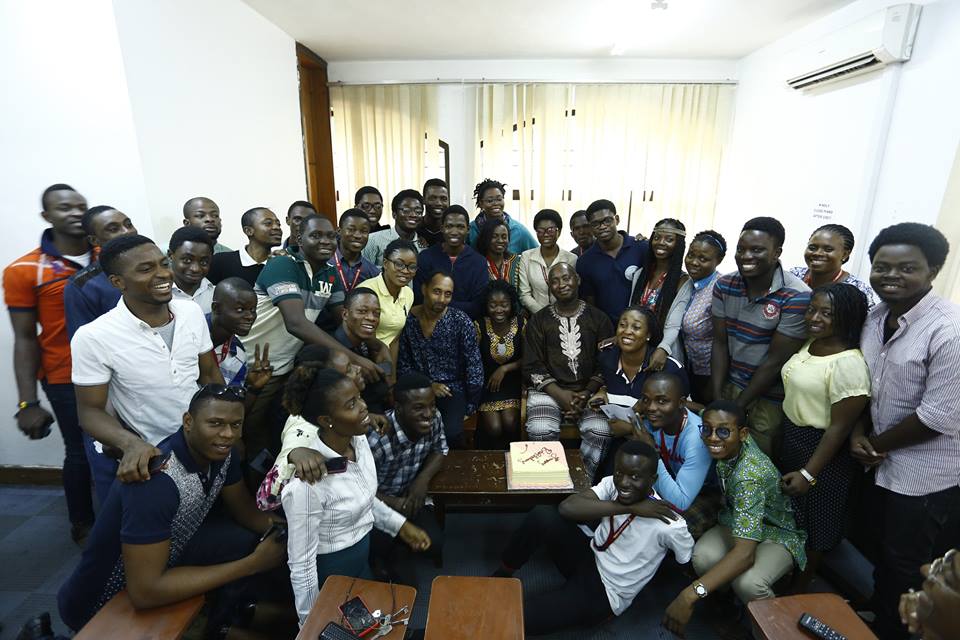
BEGINNINGS
What type of musical influences did you grow up around, and how have they shaped your identity as an artist?
My musical journey began very early. I think almost before the age of one I was already playing drums—that’s what I was obsessed with as a baby, banging drums. My father was a poet and a percussionist, as well as a visual artist and a sculptor, so I grew up around the influence of music and art from the very beginning.
At the age of 7 and 8 I took up playing the kora and the cello. The cello I first heard being played at school, and I was simply drawn to the sound. Then I saw a visiting kora player from Senegal based in Paris, and when I heard him perform on that instrument, I again was just drawn to it, I just knew I had to play it.
I didn’t necessarily associate either instrument with a particular culture at this time, I just heard the sound and followed that. But learning those instruments took me on two very different musical journeys—on one side I was studying Western classical music on the cello at a specialized school in London, and on the other I was learning the African classical tradition with a master of the kora in Gambia.
I first traveled to Gambia when I was 9 or 10 to study with Amadu Bansang Jobarteh, a master from one of the five principle griot families, as we call them. These families are part of a hereditary tradition that goes back 700 years, to the thirteenth century. Since then till now the Diabate or Jobarteh family, which is the family that I studied with, along with the Cissokho, the Kouyate, the Kanuteh, and the Sako families have all been playing this music.

And so I was learning these two traditions of music in parallel, not crossing over at all, but leading a sort of schizophrenic existence between the Western on one side, and the African on the other.
Then when I was around 14 or 15, there was a big jazz boom in London. A lot of talented musicians started coming through who were just a bit older than me, players like Courtney Pine, a saxophonist who came up around the same time as Wynton Marsalis. Inspired by this, I began to play picked bass with the cello in a jazz trio we had at school, which opened up the doors for me to explore the music of artists like John Coltrane, Miles Davis, etc.
This was very inspirational, and for the first time I started seeing a connection between improvisation and the kora. I started to play not only traditional music, but began to make my own arrangements. I remember doing this with my sister, who also plays the kora, and creating an arrangement of Miles Davis’ So What for two koras.
Other early influences came through my exposure to what was happening at the arts center my father was based at, the Keskidee, which was one of the first and only black art centers of it's kind in London in the early 70's. Anyone having anything to do with musical culture coming through London at that time passed through there, including people like Bob Marley and Linton Kwesi Johnson from the reggae scene, as well as Bouli Cissokho, and even Angela Davis.
So I was around this kind of creative environment from a very early age —not being aware of it being very special or anything— but just being in the presence of some really great artists. And when you add all those things together, African and Western classical influences from learning the kora and cello, delving into jazz and the music of the African diaspora later in my teens, and my exposure to the arts at the Keskidee, I’d say that encapsulates all the main styles and worlds that have influenced my music.
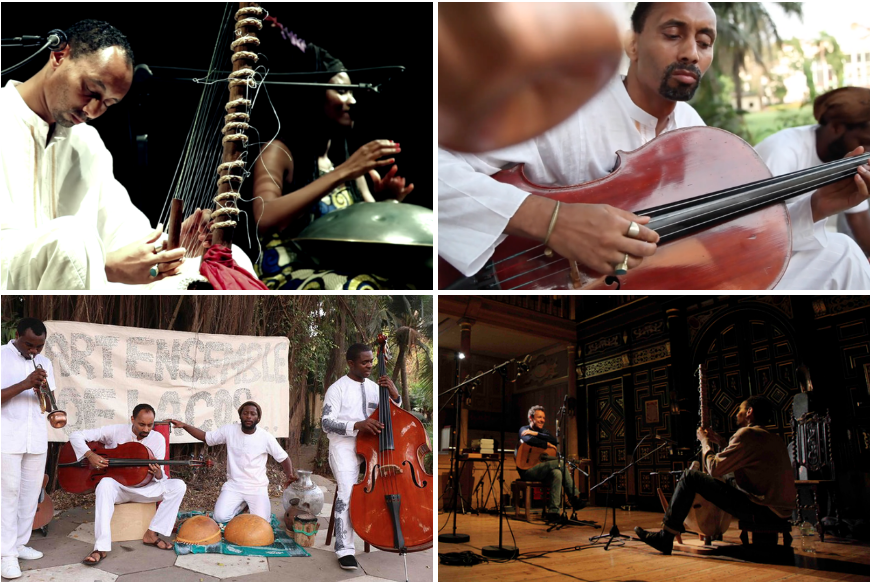
SOURCES AND CYCLES
It’s interesting to observe this full circle effect with the music of the African diaspora: it leaves Africa, makes its way through the Caribbean and the Americas, becomes reggae, blues, jazz —all this interesting music— and then finds its way back to Africa again. I teach the banjo and often tell my students the story of how the source of that instrument actually comes from Africa...
Yes exactly—there's a musician I know named Laemon Jatta who plays the a’konting, which is the instrument you're speaking of. We've included him in a project we recently completed called Living Legacies, where we documented the traditional musicians of Gambia. I created the project when I came to realize that the reality these musicians find themselves in today is very different from how it was when I studied there in my youth.
When I studied it was an oral tradition, and the atmosphere was very simple. You would go and live with the family, and learn the music day by day. There were only acoustic instruments, with no amplification—just you playing and your master giving very particular guidance and instruction, and you maybe attending a naming ceremony and playing for that.
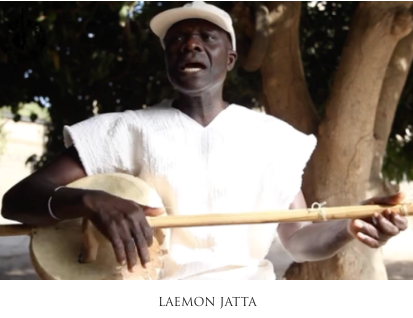
The acoustic tradition has very little presence there today, and because of the lack of demand and exposure for it, it's a negative cycle that causes these musicians to have no real forum to carry on their music in the ways it has been done for generations.
And so in this project I recorded musicians like Laemon Jatta, because people were actually telling me when I came around that there were no more balafon players left, no more a’konting players left, etc. And it was tragic, because there still are, although people don’t know it, and even though they're just about fading away.
So in this project we went and recorded all the main players of the new generation. I knew all of their parents and grandparents, who were great players, so I approached the younger generations and asked them to perform one or two pieces they felt represented their family, or their particular way of playing. We recorded them very simply in either solo or duo performance, with no amplification, and in the elements.
So the idea was to document them, to give them a presence, and say 'look, they are still here!' And now there’s a website up, so you can see that they’re there, and from this we now want to trace back to their grandparents, and find recordings of their performances, so you see the continuity there.
That’s very interesting, and reminds me of the folk revival in the United States that was kicked off by Alan Lomax, doing precisely that same kind of work.
Yes that’s very much what I’m interested in, source traditions, and the journey of those traditions, because my life has been the story of that circle—starting from the source, traveling through a diaspora, and coming back around, and going back around again. And if you really follow this kind of journey, you realize that it's much more than just a simple story of a source and a diaspora.
For example, if you look at say the music of Youssou N’Dour from Senegal, working in the early 70’s his group was influenced by the music of Cuba and the Caribbean. You can clearly hear that influence in what they were playing at the time, which sounded very similar to the Cuban music from that period.
Then gradually that sound became more incorporated into their local traditions of Wolof music and the talking drum, which changed the accents of their sound, so it now became much more their own music again. But then of course if you know the story of Cuban music, you know that it actually came from Africa to Cuba, and so now this music has gone back to Senegal again, to influence musicians who then in turn have created yet another new form of music.
So that just demonstrates how these cycles are actually much more complex, and that they keep cycling.
TRADITION AND SELF DISCOVERY
Can you talk a little about what would be considered traditional music for the kora, and the journey you have taken with it through these cycles?
As I mentioned, the traditional music of this style can be seen at Living Legacies Africa. This site documents the tradition as is, allowing that to be what it is, separate from this cycle of meeting points and connections.
Nonetheless, my own journey as a musician has of course been much wider than that, and it took a long time for me to realize that I had to be very clear with what is traditional repertoire for the instrument —if you like what is its own classical tradition— and then what are contemporary interpretations and developments of that same tradition.
I found that because people didn’t know the kora, I was often doing many of those things at once. People would say ‘oh yes, this is a kora, which belongs to a tradition from West Africa', when in fact what I was playing was maybe a contemporary rendition of that tradition. So I had to start being very clear about what my own compositions and accents were on that instrument, and what was the tradition itself.
This led me to actually set up an African Classical Music Ensemble. The idea with this was to play more or less traditional repertoire only, so there would be a clarity for audiences between these two forms when I present them in my work.
I made a recording with this ensemble in Mali with two koras, guitar, traditional fulani flute, and the great Malian singer Kasse Mady Diabate. In the album I wanted a very traditional kora player for the lead, so I took a back seat within the music and let the other player lead, Wali Cham from Gambia, so you could really hear a traditional accent in the music.
On the contrary, my first album Still Moment is almost more of a contemporary new age album really. The b flat minor tuning I used for the kora is not a traditional tuning, and the pieces are all my own compositions. If you hear my more traditional album Heritage, and you hear Still Moment, you probably hear a connection through rhythms, themes and things, but they are in fact very different.
So with Still Moment I was taking the tradition somewhere else. But what's interesting is that I did the traditional album just last year or the year before, and I did Still Moment a long time ago. So I actually did the contemporary one before the traditional one, if you like.
And in a way it was that same journey with the cello, in that I did Lamentation first, which is an album that combines classical strings with African traditional instruments like the balafon, koras, etc, and it was all my own music.
And then my solo cello album I just did called Testimony contains Bach suites, so I went through exactly the same process with both instruments.
I think I felt that now, at my age, I was able to hopefully play Bach in a way I would be comfortable with, after 40 years. It's not something I think you should do when you’re twenty —not because you cant play the notes— but just because Bach, and his Suites in particular, require a certain amount of experience living with that music, and deciding what you want to do with it, what you want to say with it.
And with the kora it was the same. What I wanted to say within that tradition, because I respect it, I felt I could do something with that now, basically at 40 years old. Whereas exploring my own music was something I could do in my twenties, because it was more about finding my own voice. And so it's been an interesting journey in that way.
THE COMPOSER
It seems that on both ends we're talking about styles of music that require time in order to truly understand the depth of them, because they reach very far back. And although we’ve discussed African music now a bit more at length, would you consider yourself equally steeped in the classical tradition of Europe as well?
Oh, definitely. As I mentioned, from 9-18 I was in classical music school, and then attended college at the Guildhall School of Music. But I actually knew quite early on that I didn't want to be an orchestral player—I love chamber music and playing the solo repertoire, but I knew I needed more personal freedom for interpretation than playing in an orchestra would give me.
Eventually I realized composition was actually the vehicle that would allow me the kind of creative expression I needed. Even though I never studied composition formally, it was the natural result of all the worlds that I'd journeyed through, and a way for me to create a form of music that brought them all together.
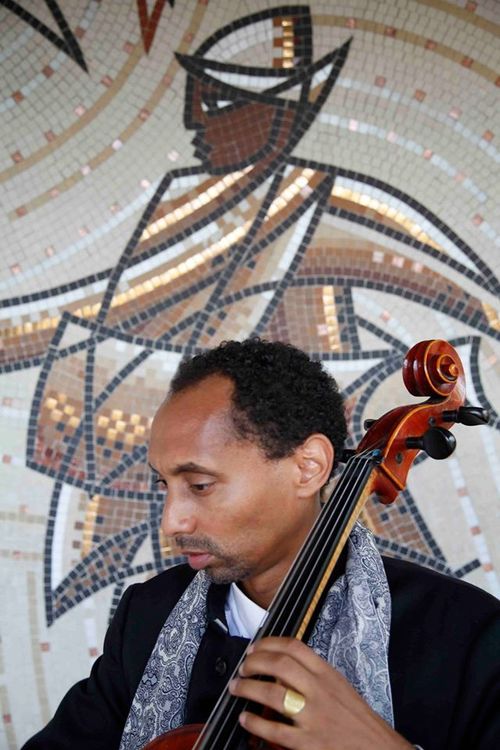
So in my works, I might have an orchestra, a traditional African musician and a jazz singer, and where that might be new for someone else, it's normal for me, because I’ve been in all those worlds. So composition is really my entry point into the classical world now. Meaning, apart from my album Testimony, where I played Bach Suites along with my own compositions, I don’t really go out playing concerts of just the traditional classical repertoire of say Beethoven, Bach, etc. on the cello. Well I mean, maybe if I was asked, maybe...(laughs)
So you recently composed a kora concerto, and in your notes you explain how you wanted to stay true to the classical tradition while honoring the musical worlds of West Africa - much in the same way that Rodrigo combined classical music and Spanish folk influences in his celebrated guitar concerto.
Yeah, it’s a tricky thing to do, which is why I mentioned the Rodrigo concerto, because it helps to give people a reference point to understand where I’m coming from, and to see that it’s not as out there as it might seem initially, in terms of the classical repertoire. But it's a challenge to balance all those traditions so that they have space to be what they are, but at the same time work together.
There are many situations where people have tried to write the kora into something, such as in film compositions, and it can be steel toothed if it's not done carefully. I always have to be very careful in film recording sessions, because when a composer decides to write for an instrument like the kora, sometimes they think 'ok, I'll write a sort of melody for the kora, and he can come and play it.' But even though I can of course read music and all of that, it's actually much easier for me to just take a theme and improvise on it. So if you start me like this in the right way, I can do something in like 5 minutes. But if you start me in the wrong way, I'm just there reading the score, and that methodology is very alien to the instrument.
You can hear in the concerto that the orchestra got a chance to think and perform in a way akin to what you are describing: they got to play from a perspective stemming from the performance practices of the kora and, conversely, the kora got to play in ways that would traditionally be done by the orchestra. So in addition to the two traditions being honored, they actually had a meaningful dialogue with each other...
Exactly. I treated it as a call and response, just like when two improvising musicians are playing off of each other. So if you score a part that has that similar kind of energy, they play at you, and you can play back to them... and even though it's scored, it will sound like you're playing back what you just heard. I wanted to keep that energy throughout the piece, so I left it more open, so the kora could respond to what was going on in the moment, with enough space for us to breathe, if you like, as improvising musicians.
And where do you gravitate to as far as European classical music? Who are your primary influences, your big composers?
Bach was the main one early on. My grandfather was a church organist, and he loved Bach. I think he passed that love on to me, and we used to play cello and piano together from a very early age. So from 8 or 9 I gravitated to the Bach Suites in particular.
In fact, I have an affinity with Bach, Vivaldi and most of Baroque music in general, and funny enough it has an affinity with African music. I saw this connection very early on between these two genres. And then interestingly enough not only the beginning of classical music, but also the end—composers like Stravinsky, Shostakovich, Bartok... I connect with the rhythmic content of their works.
I like the Shostakovich cello concerto, which had a big influence on me. I wrote my own cello concerto, Invocation, and it was very much inspired by that piece. When I’m inspired it's not direct however, so you won’t necessarily hear Shostakovich in it; but the rhythmic drive of his work showed me the possibilities of how the orchestra and the cello can play almost like funk music, classical funk music, in the way that they drive across each other. Another cello concerto that influenced me in that way was Kabalevsky's, that also has that pull and push.
It's interesting you mention how the baroque seems to have an affinity with African music. I find this is true as well, in the sense that it also has a closer relationship to European folk music. It's a sort of organic approach to music that has a very driving force behind it. Then in the 20th century you also find characters inspired by a return to folk traditions, with a drive to express a sort of intensity and visceral feeling in their music.
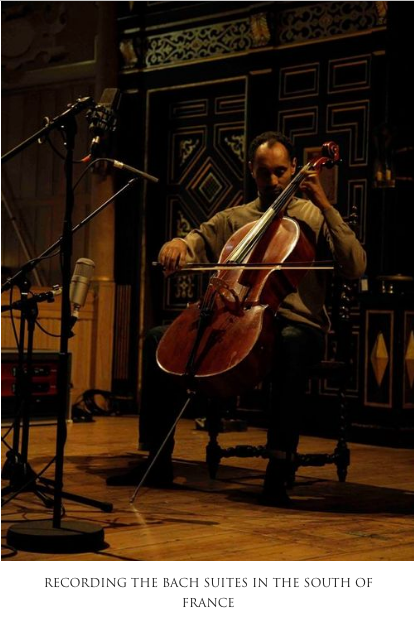
Yes and I don’t consider myself an anti-romantic, there are many great pieces from that period, such as Faure’s Requiem, but I'm just saying that my main affinity would be in those places. And also with some of the later composers like John Cage, Steve Reich, Terry Riley, and some of Phillip Glass’ work. Arvo Part is another composer I have a lot of respect for in our times.
So there’s a broad range, and when we come to things like jazz, I’ve mentioned Miles Davis and John Coltrane, but then there are also people like Keith Jarrett, who’s an interesting artist, and Egberto Gismonti, who is someone that really impacted me directly, because I saw him play live in Brazil.
I think what really hit me from Egberto, is that when he came on stage he didn't have a big aura about him, he just came on quietly and sat down with his guitar, but when he started, it was like bang, a light went on. Because you know, sometimes it can take a minute or two to get into the mood of playing, but he just went bang and the music was just there. I was young, probably around 19 or 20 at the time, and I thought 'I need to go back and re-evaluate, and restart again with the kora...' in terms of how I was approaching it.
So that had a big influence on Still Moment, where I felt I needed to approach the kora completely differently, as far as what was possible with the instrument. Because when I heard Egberto, he was using a drone and playing the melody and chords all at once, and so in Still Moment I was exploring this same way of playing, which was very different from the traditional style of the kora, and was a direct influence from hearing Egberto play the guitar. And of course he then left the guitar and walked over to the piano, and started doing the same thing there—at which point you don’t like a musician like that, he’s just too good!
And he actually had an interesting story of his own journey as well—he went to study with the famous French composer and teacher Nadia Boulanger, and I think she said to him, 'you have come from Brazil, and it’s great you are studying music here, but don’t you have any music there?'
Very similar to what she said to Astor Piazzolla.
Yes, and then he said ah-hah, and when he returned to Brazil he went to the forest and hung out with the Amazonian Indians, and really delved deep into that. So like I said cycles... that was his journey, and then I hear his solo album, and it influenced me and my own journey. So it’s always a more complex story than it looks like on paper—someone from Europe telling someone from Brazil ‘go back and check your sources’, and that changes his entire musical trajectory.
THE HUMAN STORY
So as people journey through these cycles, not only across Africa and Europe, but in the indigenous Americas and the rest of the world, our influences and identities expand, as do the genres and styles of music themselves. How do you see the course of this phenomenon unfolding in the future?
You know I think there are two ways: it can be very visionary, or it can be problematic, depending on how the same thing is addressed. I had issues early on with the term world music, because I didn’t think it was a helpful way to explain things. I actually felt like a lot of the early collaborations and explorations of the 70’s were much more genuine.
Meaning that, if you look at someone like John McLaughlin, and what he was exploring with Indian classical music as a jazz musician, there was a very genuine exchange, and you can hear that in the music. Because he went to India, got an influence, and then really engages with that music as a jazz musician. And the fact that he originally came from the UK and went to America to explore the jazz tradition, and then went to India, and what is that—it's a journey. But then later on people ended up calling that fusion and various things.

But when you look at a lot of the so-called crossover things that happened later, they were done with much less depth in a way. It was like 'ok, this-meets-that-meets-this,' and a lot of it was on the surface, rather than someone who had a personal interest in delving deep into something.
So in that way it's showing you the future could be very bright, or not, depending on how we approach the process. How do we balance all of these influences, and find an authentic voice—I think authenticity is the key.
So I never really resonated with the term world music, because when I did my album Lamentation, and it had cello, kora, ballafons, African instruments and Western instruments —and this was in 1995, before crossover really existed as a term— people didn’t know how to label it. So quickly the word fusion sprung up, because it was easy for people to go ‘ok, so this must be some kind of fusion of African and something and something...' which doesn’t take into account the journey we’ve been talking about.

And multiple journeys in fact, because I’ve had a journey of a journey that Egberto’s had, or Miles Davis has had, and so it's too simplistic to say ‘oh yeah, if you put Africa and the West together, this is what you get.’ Because that doesn’t explain how I was influenced by Egberto, who was influenced by Amazonian Indians, because where does that leave us? Is my music Amazonian?
So it's more complex, and in order to truly understand, you have to go to the roots of music as a human legacy. It’s always been the same, there’s always been a journey in music. I saw a book recently by Yehudi Menuhin that was very interesting. In it he looks at the human experience of music, and effortlessly goes from talking about a kora player, to a violin virtuoso, and then Bartok, and then an Indian classical musician like Ravi Shankar, and he brings all of those things together in one story. And so for me it's not about fusion, it's about a human experience, about looking at the world of music as a human experience.
So my problem with the idea of world music is that it's often more about trying to label things based on geography, rather than the human story of the music, because it's understanding that story that shapes the interpretation, and guides where the music goes. So I think if we embrace the journey properly, the future of music is very bright. But if we just take the surface of things, the same journey will not be so bright.
MAKING AN IMPACT
So can you talk about some of the work you're doing at present?
Well right now I am in Lagos, working here at the MUSON Centre and School of Music, which is one of the only music conservatories in West Africa. We have about 60 students over two years, and it’s the only place in the whole of Nigeria where students can come to study music as a specialized curriculum.
And it's a shame, because it's very different here than say in Gambia or Senegal, where the traditions are still within the village setting, and you can still go and stay and study with a family within that context. Lagos is a very urban environment, and a very different cultural experience—it's like New York, but with more heat, more chaos, and it's Africa... so it's like a crazier New York!
So here at the MUSON we're studying Western classical music, but I’m trying to make more of a connection with what’s going on outside the walls of the conservatory. We’ve got some really interesting things happening in the city, like the Shrine, the musician and activist Fela Kuti’s old place, which is still being run by his sons.
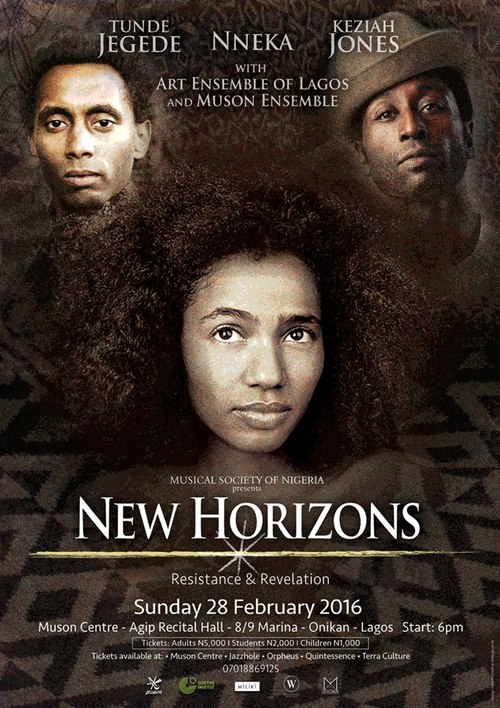
So there’s great music going on in Lagos and Nigeria outside, and it's about trying to connect what’s happening here as a conservatory with what’s going on outside, and seeing what music we can create with that.
I’ve developed my own new music series called New Horizons, which we started last year, and we have our first concert of this year's series starting at the end of the month. It's more of a jazz oriented concert with artists like Nneka, a very good young singer songwriter, Keziah Jones, a guitarist and singer/songwriter, and then my Art Ensemble of Lagos. So it’s going to be an interesting combination.
And after that, later in the year we have African Messiah, which is an oratorio I wrote based on the themes and melodies of Handel’s Messiah, but seen through an African musical worldview.
So we have that coming up, which draws on both traditions, and then in the summer we have a performance that features contemporary African music and dance, accompanied by strings and kora.
I’m also developing a chamber orchestra here called the MUSON Ensemble. And the music that I do with them, when it’s classical, is baroque, bringing us back to our conversation before. We do Bach, Vivaldi, all of that, and I let them try to see the connections as they play. And the funny thing is, although it was first just a theory of my own, I've actually had the chance to put it into practice here.
And I've found that when they play certain other musics, it doesn’t resonate with them in the same way, in terms of understanding it —like the romantic style, it's a different experience— but baroque music they can play, because there’s a connection there. They can play it with, I wouldn’t say an African feel, but in a way it almost is, through the rhythms that can come out.
I feel the same connection with it, it's very direct and speaks right to you, without having to unravel a complex language...
Yeah, and I also think in a certain way that Europe was much closer to the rest of the world culturally at that time. You had the royal court traditions and patronage, etc., and in Mali and West Africa you had those same things. So there was a feudal system on both sides, and there was a lot of cultural exchange going on that you can hear in the music.
More than was often hinted at, to the point that it's now commonly known that lute instruments are the descendants of the oud, and from that parentage came a lot of classical and folk music.
Yes exactly, so when we're looking at these connections, we know about that history. When I speak about Rodrigo as an example, I know about the Andalusian, Hispanic and African connections, so it’s an obvious access point. And when I look at Stravinsky and The Rite of Spring, I know about the folk rhythms he was trying to express. So it’s always about connections, with all the music and other things I’m inspired by. I start to see the parallels and connections between them.

And here I’m trying to do that same thing with my students, drawing out those connections for them to see. Because when I first came here they were seeing Western classical music as something external, and were like ‘ok, we are learning Western music, and now we do it like this, and like that...’ So I had to break it down, and say 'look, this is music, it has to be real for you or there's no point in playing it.' You have to ask 'what’s this guy saying, and why is he saying it... what is this music?'
And so we began sharing stories of these composers, what they went through, and what their thing was about, to connect with them. Like for example if you take say Beethoven, what’s the common thread between someone like Beethoven and Fela Kuti? They know Fela Kuti’s stories, but if you just say Beethoven they think 'Beethoven, well he’s over there.' And so I say 'ok, well let me tell you a few stories about Beethoven, this guy was a proper rebel, who didn’t take patrons very seriously —aka the government— and he was always insulting them, except when he needed things from them, etc...' and they start to laugh, and say 'ahh, right, so this Beethoven is a bit of a Fela Kuti... ok, now we get it!' And they can start to see the connections, and it's no longer something foreign to them.
And in my opinion, that's exactly what’s been engendered in the culture around classical music that needs to be broken down—that it's taken real life characters and real life music that is directly accessible, and turned them into something very inaccessible...
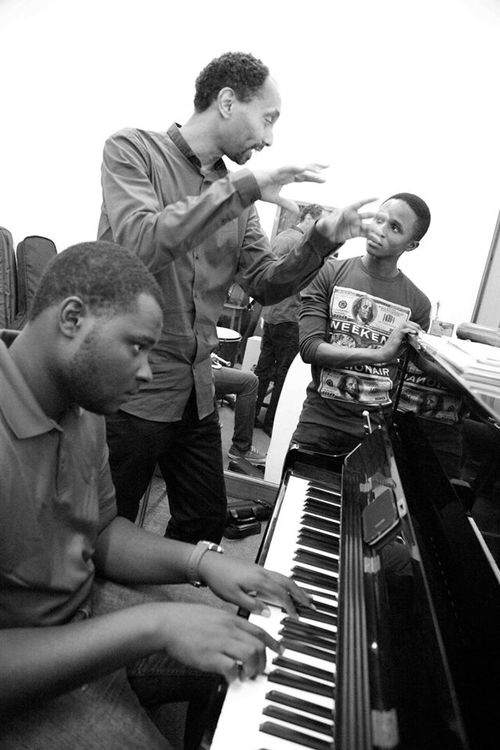
Exactly! You take someone like Beethoven, and you see him as a statue, which a lot of people see and say ‘that’s Beethoven, and he’s great... and that’s it, so don’t say anything, don’t ask any questions, just do it.' Rather than ‘this is a human being. What did he go through, who was he?'
And the same for Bach, who was a great improvisor, and never heard most of his own music played properly in his lifetime, and had things said to him when he was employed like 'oh, we couldn’t get Telemann, so we have to put up with you as our second hand Telemann,' J.S. Bach!
So when you understand those stories, you actually begin to know them as real people, and their music speaks to their real experience.
So in Nigeria then, you’re teaching people how to tap into the authenticity that’s going to help them to take all of these influences in...
And understand themselves and their own music in connection to everything else, which is exactly what we are speaking about. That’s what I’m trying to do, and it’s working, because I’m also writing original compositions that I’m sharing with them, so they get to see a composer in real life. And so I say 'look these guys were no different, they were doing this in their own time.'
Like Fela was never really celebrated in his lifetime, nor were any of these composers. Mozart died very shabbily, and so did Beethoven. They were hailed at certain points, but it was very rare that they were hailed in their time. And then later everyone goes 'ok, now they’re dead and we can lift them up...' and all the rest of it.
It's interesting that in the music business, they're always saying to spend less time composing and more time networking and getting it out there. But it seems like the greats spent zero time networking and getting it out there, and instead wrote themselves into both their own graves and into history.
Which is why it's an unfortunate story, you don’t want to check it out too much if you’re a composer, you just pretend it will all work out this time, and think 'ah well, now it's different!' (laughs)
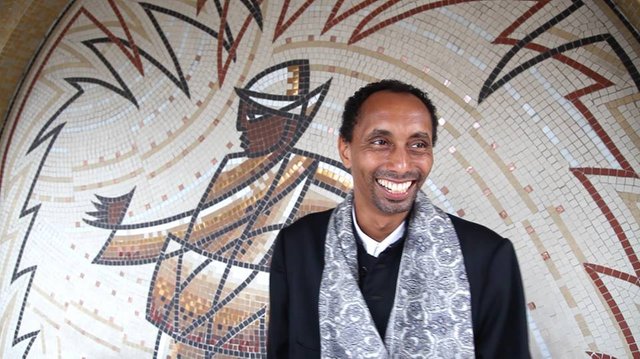
Well it certainly sounds like an exciting situation to be in, passing on your own knowledge, teaching in an environment where people are receptive, and being poised to convey the actual stories of the music to people in a way that counteracts a merely surface mentality. That’s really outstanding.
So how do we keep up with it, how do we stay in touch with what you are doing?
Well for New Horizons, we have a facebook page that is the best way to keep up with what we're doing here. It's been a lot of work, and very tiring because there’s not many people who are able to do what I’m doing here, so they get me to do everything. But I feel it's very important, because you have a lot of impact here.
You know, if I was say somewhere like in the States, there's a lot more people there who have all kinds of knowledge and expertise in many areas, and so the impact is there, but it's not as wide, in that if I’m not there the whole thing is not going to fall down.
Whereas here, you're really making a difference, because now that you’re around, suddenly all of these people are getting something they wouldn't have access to otherwise. So it's very demanding, because there’s such a big need, but it's good because you feel useful, over useful maybe, but it's better this way around, to be where you are needed, because you can see and meet that need first hand.
